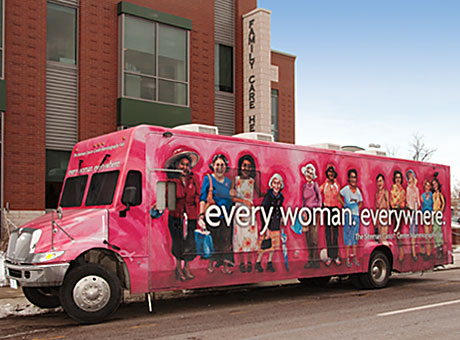
To improve access, the Alvin J. Siteman Cancer Center mammography van visits churches and community clinics in underserved areas.

To improve access, the Alvin J. Siteman Cancer Center mammography van visits churches and community clinics in underserved areas.
Health-care specialists at the Alvin J. Siteman Cancer Center at Barnes-Jewish Hospital and Washington University School of Medicine are working to improve breast cancer care for African-American women living in North St. Louis City, an area in which death rates from breast cancer are disproportionately high.
“Although African-American women are less likely than white women to get breast cancer, they are 37 percent more likely to die from it,” says Sarah J. Gehlert, PhD, the E. Desmond Lee Professor of Racial and Ethnic Diversity at Washington University. “And in St. Louis, that disparity is even greater.”
With support from Susan G. Komen for the Cure, researchers at Washington University’s Program for the Elimination of Cancer Disparities (PECaD) seek to identify reasons behind the breast cancer disparity and to help close gaps in care that leave African-American women in North St. Louis particularly vulnerable.
“We’ll be looking for barriers that some women experience as they navigate their cancer care,” says Graham A. Colditz, MD, PhD, the Niess-Gain Professor and a co-principal investigator on the project with Gehlert. “African-American women in North St. Louis are more likely to get a diagnosis of late-stage breast cancer. And if they get a diagnosis, they are more likely to drop out of treatment. From a community perspective, we are working to map out the complex web of reasons why people might not follow through, or be able to follow through, on treatment.”
Washington University investigators will collaborate with four community partners in the region, including Christian Hospital, Betty Jean Kerr People’s Health Centers, Committed Caring Faith Communities, and the Women’s Wellness Program, part of the St. Louis Effort for AIDS.
With their help, the researchers will hold town hall meetings and one-on-one interviews with breast cancer patients to try to understand the barriers women encounter and help the institutions adapt their practices.
“We’ll follow women who never went to treatment, women who began treatment but for some reason did not complete it, and women who finished treatment,” Gehlert says. “To reduce these disparities, you can’t just develop better chemotherapy. You have to go into the community.”